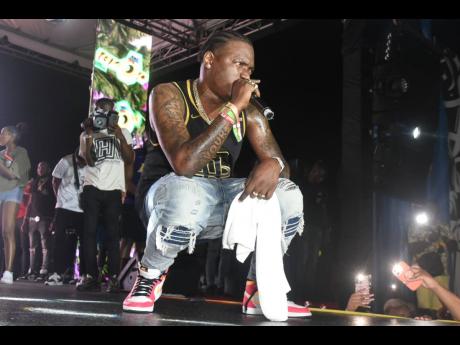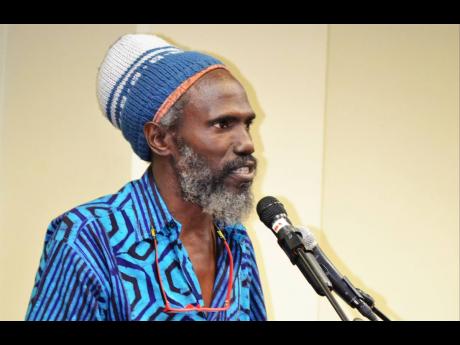Jahlani Niaah | Brushing off being called ‘dunce’
Valiant, rising dancehall star, provides us with episodic insights into a world many older Jamaicans may not fully understand, nor even imagine. Capturing the popular imagination, the word ‘dunce’ has become a brand linked to schoolchildren and is displayed especially on backpacks. It is believed to originate from the song Dunce Cheque by Valiant. The artiste has a catalogue that includes other hits such as Siance, Rasta and Mad Out. Dunce Cheque is his biggest success to date.
The word ‘dunce’ emerged in the 16th century. It was derived from the name of the beatified 13th century philosopher-theologian John Duns Scotus.
His followers opposed Renaissance ideas in favour of classical studies. They were derogatorily called ‘Dunses’. First signifying a clash of ideologies, the word ‘dunce’ was later applied more widely to slow learners of all kinds.
In the Jamaican context, ‘dunce’ is a highly pejorative word. No doubt, it was introduced by British missionaries and school masters to describe those non-Europeans who didn’t immediately take to the alienating English language, cultural texts, fables and overall subjects that were being taught. Colonial religious and teaching institutions helped to erase African-ness, which was deemed to be uncivilised and unintelligent.
Africans who showed interest in and developed mastery over Sunday school and Bible lessons and who gained European language competencies were seen as ‘bright’. Conversely, ‘dunce’ was a social marker usually for the African who did not grasp the full performance practice of the English culture; and who revealed inappropriate grammar, diction, pronunciation and other such ‘unschooled’ displays.
Even today, many learned Jamaicans prioritise the now British-American cultural sensibilities, codes and mores in the production of ideas, communication and governance in general. This is noticeable across many institutions: schools, churches, courts, parliament, including the British Sovereign that all operate in a culture that is alien to the language, music, art, nutrition, medicine, occupational interests and aspirations of the African majority.
DANCEHALL UNIVERSITY
Some may view as dunce the post-Independence official leadership who promised the departing colonial slave-masters that it would be business as usual. This meant preserving the British colonial legacies, while castigating Rastafari as a type of dunce: mad, ignorant, delusional and unprogressive, largely because of the collective fixation on the issue of reparation for the transatlantic chattel slavery of Africans.
Also, a critical view of secondary education could make a solid case that ‘dunceness’ has become institutionalised. Less than 40 per cent of Jamaican students pass five CSEC subjects, including maths or English; and below 30 per cent pass both maths and English. These qualifications are important for conventional professional development and for access to a range of post-secondary institutions.
Many school leavers who would be classified as ‘dunce’ actually earn success with hardly any academic qualifications. Dancehall becomes a genuine university for some of them. Youths who are often school dropouts find enlightenment. They move from idleness into occupations and arenas where word-art is still subversively celebrated and preserved in an African-Jamaican aesthetic context.
In the dancehall, the idea of freedom of speech and thought is taken to the limit. Creativity and talent bring the débutante to the global stage. This has been the trajectory of so many of the stars who continue to transform themselves and those around them by the ideas they are able to trade musically.
‘BACK A DI CLASS’
Valiant is a consummate satirist. He can be compared to US artistes such as Childish Gambino whose “This is America” highlights the materialism of American culture. Valiant has been effective at getting public attention. His song Dunce Cheque and the accompanying music video are a peek at what is happening on the ground. Some schools offer students lessons in partying, badness, girls, designer clothes, perfumes, sex, alcohol, aphrodisiacs and, of course, money stress.
Defence
These are the focal messages conveyed in Dunce Cheque, at a time when “money a di subject”:
Bounce check ina account and mek the skull upset (upset)
None a unuh nuh know dunce yet (dunce)
Back a di class mi nah nuh subject (yah)
English gyal ina di Bimma want rough s** (b**h)
She pop di molly hard but she nuh drunk yet (drunk)
Drift di Crown hard and mek she get upset
Yow a money a di subject (subject)
In his defence, Valiant argues, “Calling people dunce was used as a way to discourage or hurt feelings of the youth so I thought of a way to give kids confidence if they are called dunce. I want them to know that they can brush off being called dunce and make fun of it because it won’t stop them from achieving their goals.” In this way, as with so many other Jamaican inversions of terms such as ‘bad’, ‘wicked’, ‘sick’ and ‘mad’, ‘dunce’ is now being added to the repertoire of subversive linguistic terms being expounded by urban folk to deal with their exclusion from learned society.
Dr Jahlani Niaah is a lecturer in Cultural and Rastafari Studies at The University of the West Indies, Mona. Send feedback to columns@gleanerjm.com


